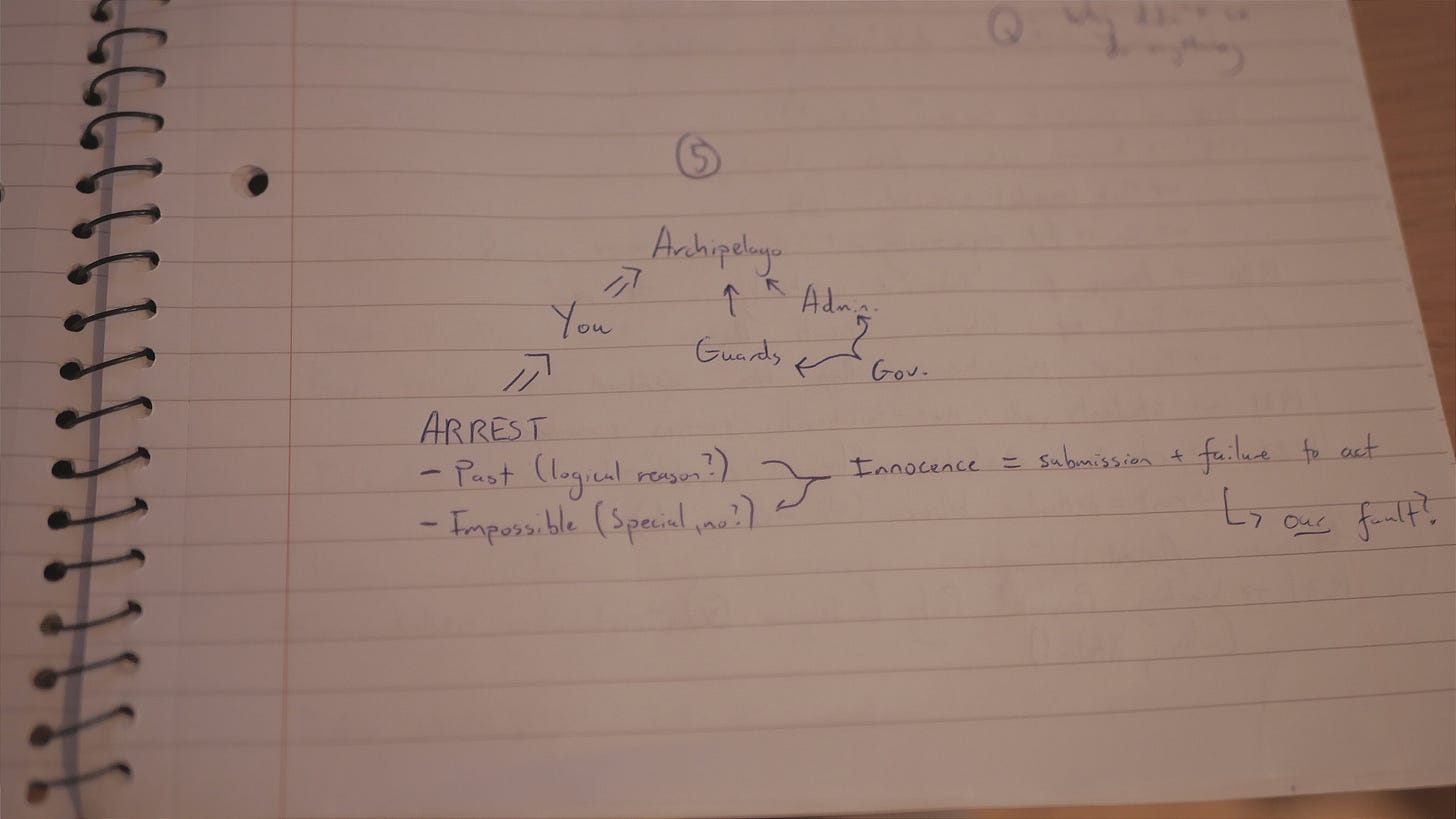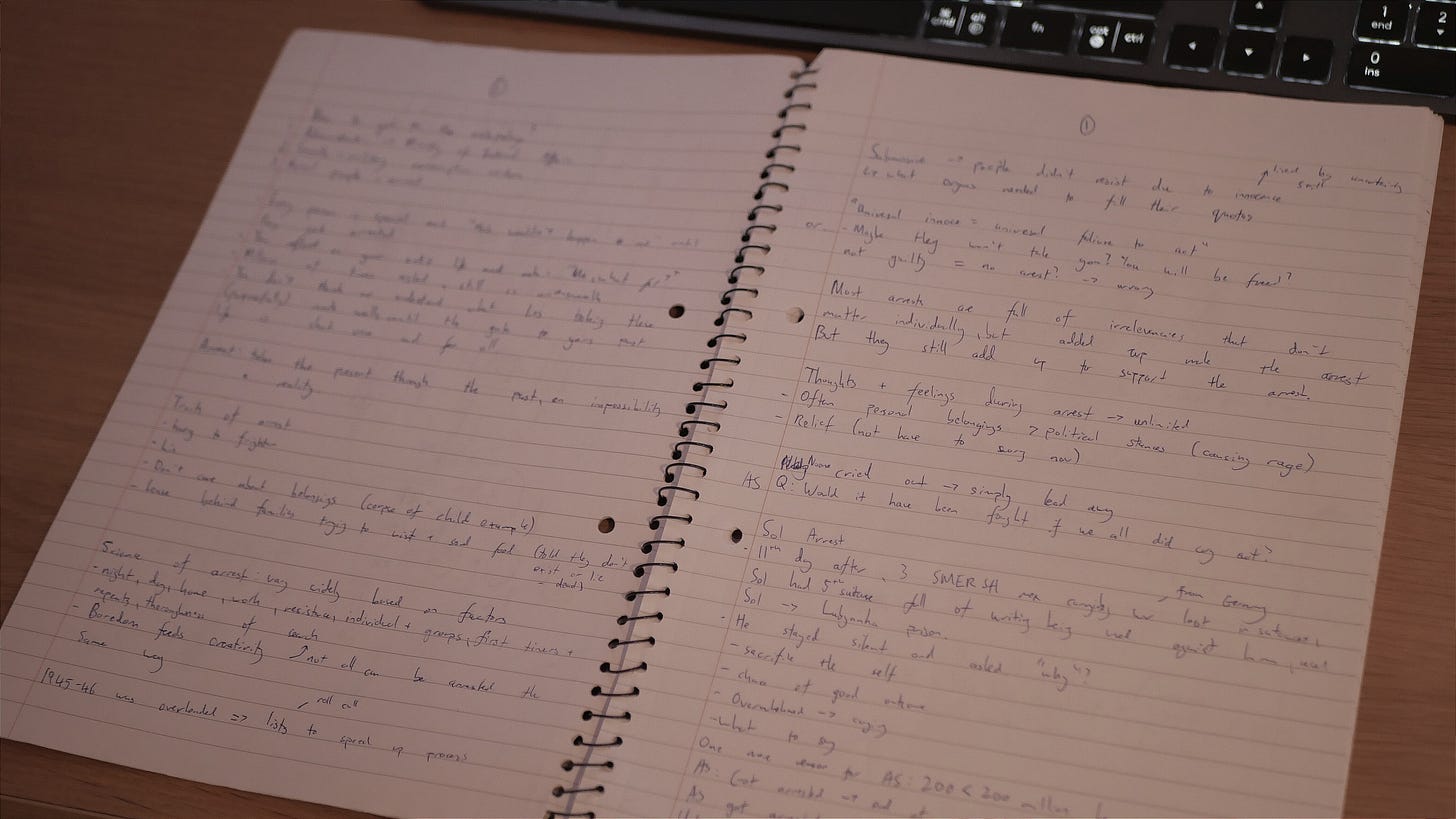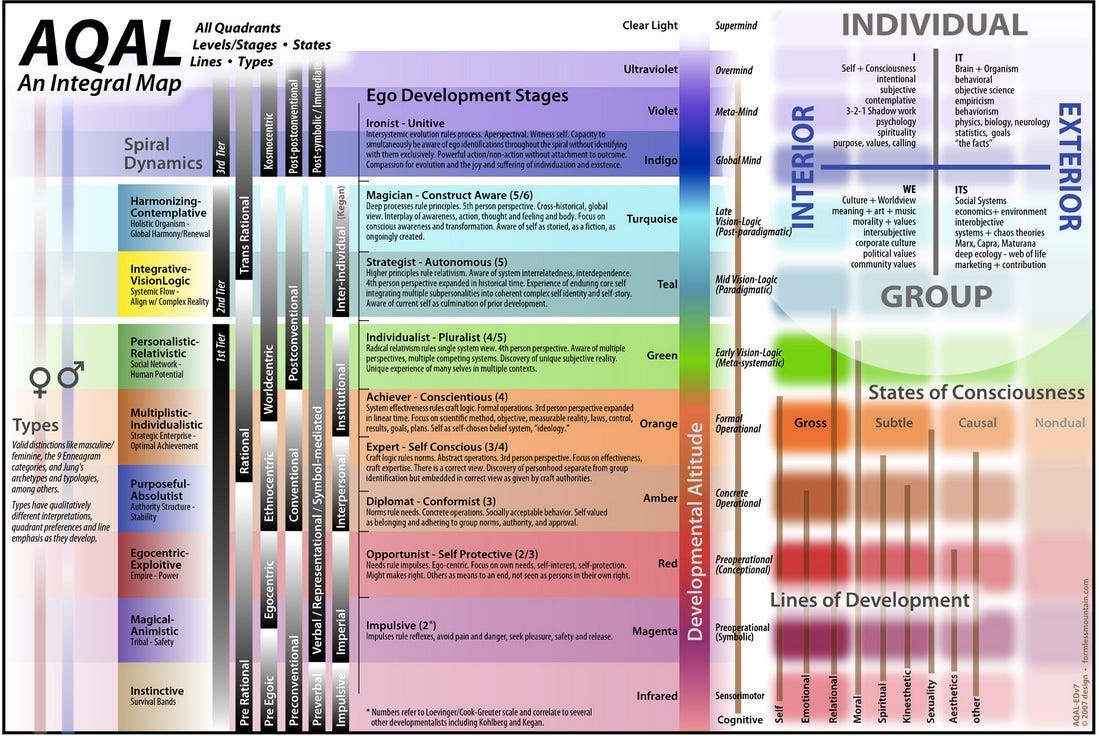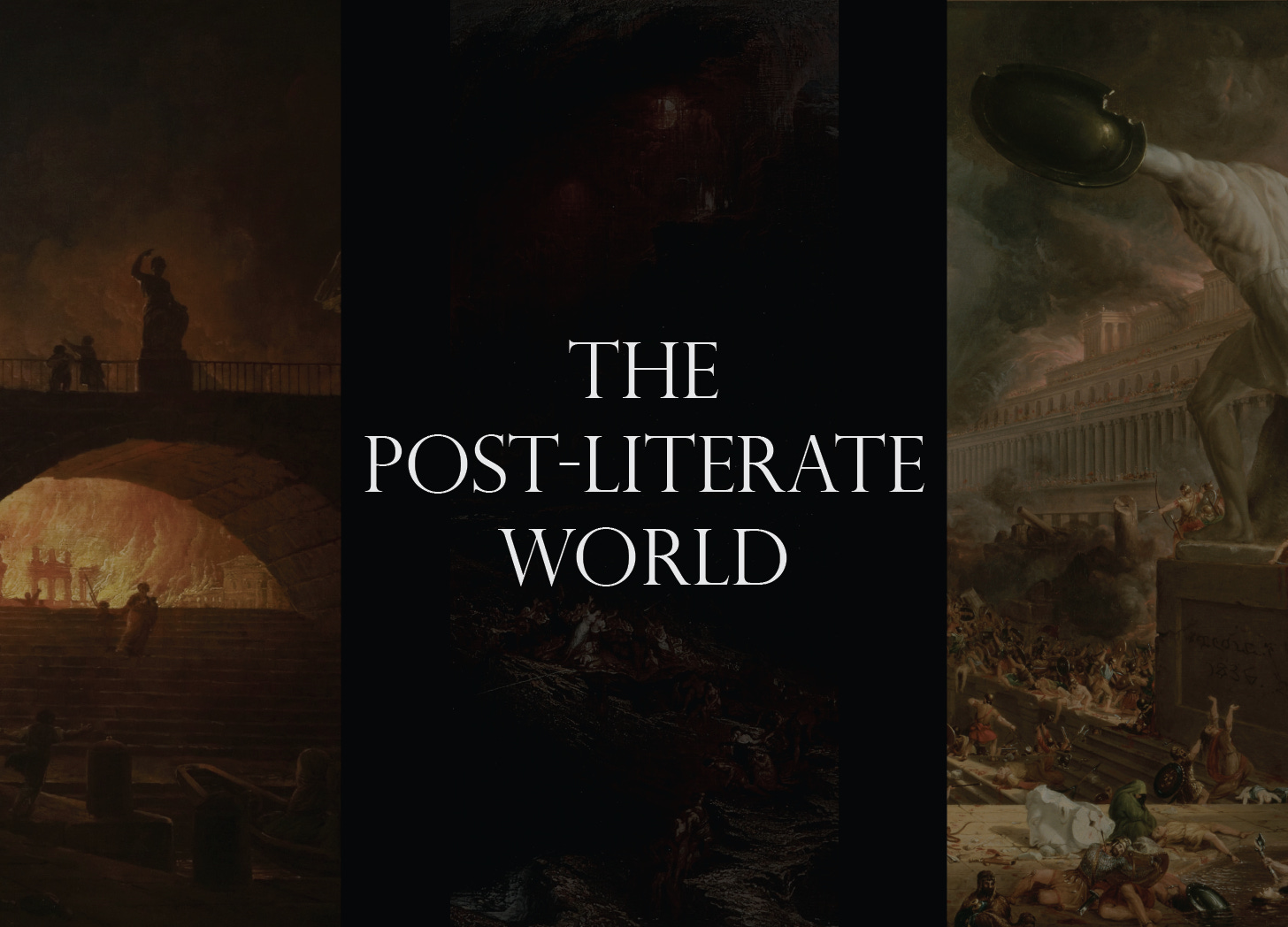The Literacy Problem, Solved
The most dangerous epidemic of our time is coming.
The video version of this newsletter if you prefer that:
If you learn to think before you act, you reduce the possibility of you doing something catastrophically stupid and suffering stupidly.
I’ve been seeing the literacy problem being discussed a lot recently.
Being dead honest here, I actually had to google what the word “literate” meant.
literate /ˈlɪt(ə)rət/
able to read and write
Oxford Languages
Big yikes, I know.
It made me realize the literacy crisis had nothing to do with reading.
It’s about what lies beneath the art of reading.
Thinking.
40% of fourth graders in the US can’t read at basic level.
28% of US adults are functionally illiterate.
The average person spends 7 hours a day staring at screens.
Yet, we consume and read more information (on our phones) than any generation in history.
Why is this so paradoxical?
We have talking encyclopedias in our pockets, AI that answers any question, unlimited access to human knowledge.
Why are we not leveraging this and thinking more?
The smartphone revolution wasn’t the greatest theft of knowledge from ordinary people in history. It was the perfect robbery of the ordinary person’s ability to think.
The literacy crisis can only be solved within the mind.
Your mind.
Nobody else’s.
Let’s think about it, before we lose the ability to think full-fucking stop, about any sort of profound ideas.
Let us begin!
All this free information… and that’s it?
The literacy crisis is not an information crisis but a knowledge crisis.
I first came across this term “literacy crisis” in this video by Jared Henderson:
Watch it, it’s quite interesting.
Actually. No. Watch all of his videos; he has a way of genuinely comforting your soul.
So, my question is:
what the fuck is going on here?
Most people believe information equals knowledge.
This is not true.
Information becomes knowledge only through thinking, the exact skill that’s currently on the decline.
Think of it this way. You could read every page of Wikipedia and still understand nothing. You could take notes on a hundred books and still have no authentic ideas. You could memorize every fact about philosophy and still be unable to think philosophically.
Most people just don’t process what they consume.
You scroll but don’t think. You memorize facts and store information even. You takes notes to organize information on a page or in a second brain software.
But none of this creates knowledge inside your own mind because that is where the thinking happens.
Individual knowledge only emerges when you:
Understand why something works (not just what happens)
Connect ideas across different subjects and domains
Integrate new concepts with what you already understand
Apply ideas to create new solutions or perspectives
Screens have not stolen knowledge. They just raised the bar of individual responsibility needed to prevent the mind from being numbed to death.
This isn’t about reading vs. screens. It’s about how your mind processes information regardless of where it comes from.
Information doesn’t become real knowledge inside your brain by taking notes, writing flashcards, or rereading Aristotle’s The Nicomachean Ethics and trying to recall his exact argument line by line.
I tried doing this on a holiday once; do not do this.
Information becomes knowledge inside an individual’s mind when that individual thinks with their own individual mind.
Sorry, that was a mouthful.
When you understand how something is and why, it becomes knowledge within your brain. When you can connect an idea (virtue) with as many other ideas as possible (philosophy, Greek philosophy, Socrates, Plato’s The Republic, Jesus, that one and only time I shared a chocolate bar with my girlfriend), you strengthen the relevance of the idea within your mind and increase the chances of it staying in your long-term memory.
It has a purpose there. It means something to you personally.
Ok maybe my last example there wasn’t perfect, but you get the point.
Here’s what most people don’t know about learning (it’s just thinking, really):
Your mind is a spider’s web
Knowledge is non-linear by nature.
Books are presented, formatted, and laid out linearly to help us (beginners) understand the information. But the author’s understanding is non-linear. They only structured their non-linear understanding in a linear way for clarity of communication.
When an author writes about happiness, they’re not just thinking about Chapter 1, then Chapter 2, then Chapter 3. In their mind, happiness connects to psychology, philosophy, their personal experiences, other books they’ve read, conversations they’ve had, and probably a hundred other profound things all at once.
Yet we all try to memorize things linearly. One fact after another in a dead-set order.
This is not how understanding something works.
Real knowledge exists as interconnected webs, not isolated facts. Your mind is designed to create a knowledge schema; imagine a spider web where every new idea strengthens multiple connecting ideas around it. Each idea having a place within the big picture.
Here’s a mind map I drew for my own processing of the first chapter of The Gulag Archipelago by Aleksandr Solzhenitsyn. Notice how the concepts link to one another in my own way. All the thinking is happening inside my own mind and not on the page:
Here’s what the linear-style of note-taking looked like beforehand, for Chapter 1, before I turned it into a mind map to prioritize the act of thinking inside my mind above all else:
Big difference right? It took me 5 mind maps to get it right (I was learning at the time).
The issue is that although we have more information available to us now than ever before, most people do fuck-all with creating their own integrated understandings. Developing their own knowledge schemas.
Without thinking about information and trying to integrate it with other information, you’re not creating new knowledge, and you are not thinking.
This is why you a page from a book and immediately forget it. No wonder people aren’t reading anymore. It’s hard to enjoy doing most things when you do most things incorrectly.
Knowledge (101)
I don’t have to agree with everything you say, but I should attempt at least to understand it, for the opposite of mutual understanding is, quite simply, war.
Ken Wilber
Ken Wilber created what he called the map of all knowledge.
Take a look at the top right corner of the image. This is what we’ll be focusing on.
I first watched a video on this in my final year in secondary school, and always knew I’d come back to it one day for some reason.
This newsletter seems to be the reason.
It organizes all knowledge and experience into four basic categories on a single map.
It can be broken down into four parts, with two lines dividing a square into quarters.
On top we have interior and exterior divisions.
To the side we have individual and collective divisions.
Each part of the square is called a quadrant. Each quadrant represents a certain type of experience in which knowledge exists.
Here’s a quick summary of the different types of knowledge within each quadrant:
Individual Interior (Q1): Your private thoughts, feelings, consciousness - what happens inside your individual mind (this quadrant is most relevant in this case)
Individual Exterior (Q2): Your physical body, brain, observable behaviors - think hard sciences based on empirical data
Collective Interior (Q3): Shared culture, meaning, values that groups create together
Collective Exterior (Q4): Social systems, institutions, governments, technology
Now.
I just want to say this is fucking baller (very cool), and in all honesty I wanted to learn about it myself. That’s why I included this here hehe
But in learning all this information off my phone, when I should have been doing actual work at my full-time job, I realized something.
Here’s a profound idea:
The literacy problem, I think, could be solved quite effectively from the Q1 angle. This is fundamentally about what happens inside individual minds in relationship to information.
Ken Wilber himself says this model is not perfect. It is to be built upon, and there is no real 100% right or wrong perspective for all perspectives contain some truth. It’s more about understanding where people are coming from with their perspectives, their thinking.
The literacy problem could be solved relatively well if we embraced the Q1 Individual Interior angle.
Individual responsibility.
Why?
Because thinking can only be done by you, within your own mind, and nobody else’s. You can advocate for policy change all you want, but no external body can make you think a certain way. Nor can genuine curiosity and interest be forced into what you’re absorbing either.
It’s all good having schools advocate for more reading, and actually teaching kids how to read.
But I remember doing this the entire way through education, with myself and the whole classroom always falling fast asleep. In secondary school I dreamt of spending all day and night learning and thinking about profound ideas from philosophy and psychology. Not tombolo’s or The Picture of Dorian Grey.
Interest is the ultimate form of leverage an individual has for achieving anything they want in life.
External educational reforms could miss this idea. We don’t even need fewer screens. We just need more individual responsibility coming from the minds using the screens.
The illiteracy problem is an individual problem. So, maybe it needs individual solutions.
If you want to become dangerously literate, someone who can think independently and enjoy learning about things that genuinely fascinate you, here’s what I’ve found helpful in my own journey:
FRAMEWORK: How to be a profound thinker in an illiterate world
(1) Non-linear learning
Build up your personal knowledge schema.
Pick up a physical book and go on a walk. No music. No phone. Just read one paragraph.
Then, force your mind to connect that one paragraph to as many ideas as you can. Concepts. Insights. Problems. Questions in your mind. Your past experiences. Your prior knowledge. What you can remember from the rest of the book.
If you read a paragraph about courage, don’t just move on.
- THINK -
What does this remind me of?
When have I been courageous?
When have I been a coward? What other books talk about courage?
How does this relate to fear? To growth? To relationships?
The first thing you’ll feel when doing this is probably going to be pain. Discomfort. Like “my mind doesn’t work that way.”
Because that’s what I felt.
But what happened when I stopped being dogmatic about how I think?
I realized the pain is normal.
Your brain has been trained for passive consumption. Active thinking feels uncomfortable at first, simply because you aren’t comfortable doing it.
Learning to integrate your learning instead of isolating it is rarely taught, but it’s a learning superpower.
If you can learn to always see the big picture, to group and connect ideas, to create understandings, analogies, simplifications, you will create a stronger sea of knowledge within your mind, and you’ll stop forgetting everything you read.
This step is a hard habit to build. Take your time with it. 15 minutes of consuming information like this a day in a dedicated manner is HUGE.
Start here.
(2) Your interests come first
What really interests you?
You cannot force yourself to read, write, or think about something with genuine intellectual power if you’re not interested in it. Try forcing yourself to read an entire terms and conditions page if you disagree. Good luck with that.
You can only guide a horse to water but you cannot make the horse drink it.
So, what are your interests?
What signals does your soul send you?
Most people don’t choose their interests because interests are what choose you.
Follow signal and ignore any noise. What topics, subjects, or skills could you talk about for hours on end? Start there.
If you find yourself naturally curious about psychology, start with psychology books. If you’re fascinated by history, dive into historical accounts. If you love understanding how things work, pick up books about systems and processes.
If you have a book you’ve always wanted to read, start there. A topic you’ve always dreamt of exploring, start with the damn Wikipedia page even. Information is information - your thinking is what comes first.
To care about improving your thinking means you need to care about what you’re thinking about.
Full stop. Follow your curiosity, and you will embark upon the greatest intellectual adventure known mind.
(3) Master information (from all sources)
Read paperback books.
Read on a Kindle (my personal preference).
Read the Kindle app on your phone.
Read essays, guides, encyclopedias, or get AI to question you on every topic.
TLDR: read from everywhere.
At the end of the day, it’s night. But also, it’s all just information. On a screen. On a page. It’s what you do with the information that matters; how you think about it.
Read long books for an hour at a time. Read and then think.
Consume for 20% of the time and spend 80% thinking.
If you are on your phone, do the same. For every 20% of the time you spend looking at the screen (reading from it), spend the other 80% thinking. If you do this, you’ll likely encounter two problems:
You can’t do this because your screen time is insanely high already. Thinking power is hard and limited for each day
You won’t feel any interest to think about what you’re scrolling through because it’s probably a numb-fucking waste of time
This acts like an invisible content audit. Once you realize how stupid most content is, and that most content doesn’t solve anything other than your own boredom, your thinking capabilities will start improving; they will want to be improved upon.
The goal of literacy is to build a profound mind, to bulletproof your actions from as much avoidable stupidity as possible.
This goal should be attractive to you.
Thinking is the most important skill of the 21st century, and it’s only going to keep declining in our modern age unless you take some individual responsibility. What intellectual arsenal will you build to fight back against the dawning post-literate society we are inheriting? Gather some profound ideas and stand watch.
All you can do is improve your own thinking. That’s all you have direct control over.
Study your interests.
Read great books.
If you want new ideas read old books.
Go out there and master your mind.
If you want to learn how to leverage your phone addiction with a more in-depth guide, this is a must-read for you:
Anyways.
This was a fun one to research. I fucking loved writing this.
Thank you for reading.
You’re an absolute legend.
- Craig :)
Other newsletters to help you think profoundly:







“Real knowledge exists as interconnected webs, not isolated facts.”…”Interest is the ultimate form of leverage an individual has for achieving anything they want in life.”…And Profound: “At the end of the day it’s night.”
May the lights never go out as nights of reading bring new worlds into view!
Great post. Funny enough, I’ve found studying for the LSAT and learning the frameworks it takes to do well on the test help a lot in developing critical reading and thinking skills.